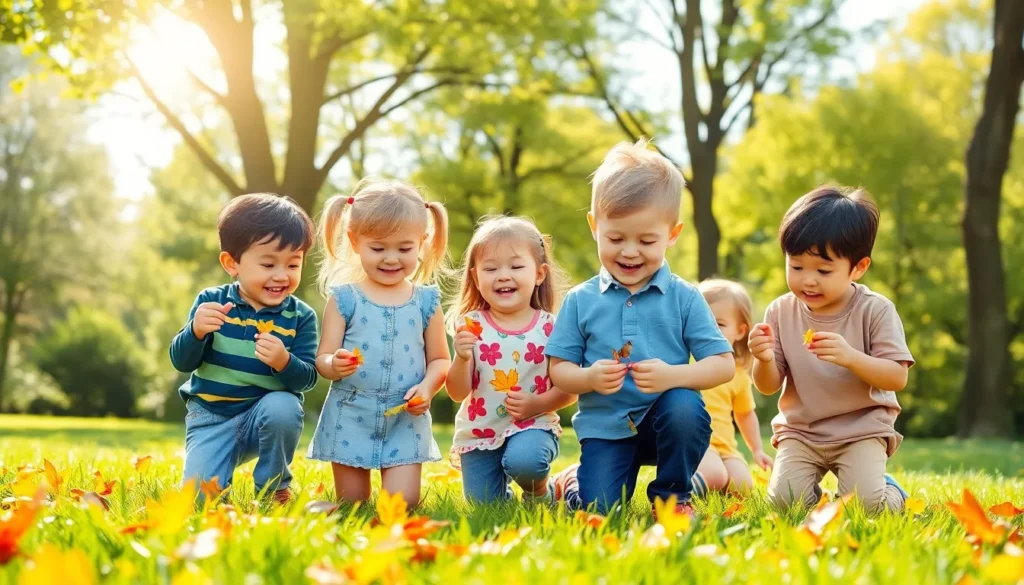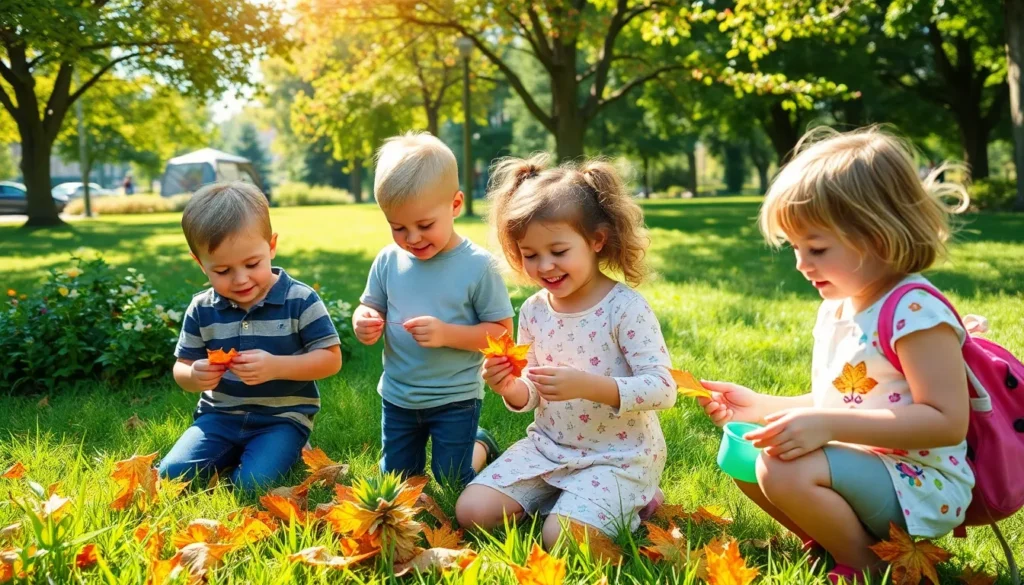Table of Contents
ToggleWhen it comes to preschoolers, outdoor activities are like candy for their curious minds and boundless energy. Imagine a world where kids trade in their tablet screens for the great outdoors, exploring nature like tiny adventurers. Not only does fresh air do wonders for their health, but it also sparks creativity and social skills.
Benefits Of Preschool Outdoor Activities
Outdoor activities offer multiple benefits for preschoolers. Engaging with nature positively impacts their overall development.
Physical Development
Physical activity enhances gross motor skills in children. Climbing, running, and jumping promote strength and coordination. Outdoor games encourage active play, which helps maintain a healthy weight. Fresh air stimulates physical endurance and cardiovascular health. Exploration of natural environments sparks interest in movement, leading to an active lifestyle. Green spaces, such as parks and playgrounds, provide safe areas for physical exploration. Children develop balance and agility through climbing and play structures.
Emotional Well-Being
Outdoor experiences foster emotional resilience in preschoolers. Nature reduces stress, allowing children to feel calmer and more focused. Engaging with peers during outdoor activities promotes social skills and teamwork. Direct interaction with the environment enhances self-confidence and independence. Opportunities for creative play encourage problem-solving and decision-making. Children learn to express their emotions freely in open spaces. Connection with nature instills a sense of wonder, enhancing overall well-being.
Types Of Preschool Outdoor Activities


Preschool outdoor activities encompass various fun and engaging experiences that stimulate children’s learning and development. Outdoor play encourages exploration, creativity, and social interaction.
Nature Exploration
Nature exploration allows preschoolers to discover their surroundings. They can collect leaves, observe insects, or identify different plants. Engaging with nature promotes curiosity and enhances observational skills. Additionally, it fosters a sense of responsibility for the environment as children learn about ecosystems. Exploring parks, gardens, and natural reserves provides opportunities for hands-on learning.
Playground Games
Playground games offer energetic fun and promote physical health. Climbing structures, swings, and slides increase strength and coordination. Tag, hide and seek, and obstacle courses encourage social interaction while developing teamwork skills. Children learn to communicate and resolve conflicts during these games. Further, active play helps maintain a healthy weight and reduces the likelihood of sedentary behavior.
Water Play
Water play introduces sensory experiences and promotes creative thinking. Preschoolers can splash, pour, and fill containers, enhancing fine motor skills. This activity encourages social interactions as children engage with peers while experimenting with water. Using tools like cups, sponges, and toys fosters imaginative play. Moreover, water play can be incorporated with themes related to science and nature, enhancing learning through exploration.
Planning Outdoor Activities For Preschoolers
Planning outdoor activities for preschoolers involves careful consideration of safety and age-appropriate options. Engaging children in fun experiences outdoors sets the foundation for their development.
Safety Considerations
Safety plays a crucial role in outdoor planning. Establishing clear boundaries ensures preschoolers stay within safe areas. Inspecting play equipment for hazards helps prevent injuries. Supervising children during play fosters a secure environment. First aid kits should be readily available for minor incidents. Additionally, ensuring children wear appropriate clothing protects against weather conditions. Sun protection and hydration are vital during sunny days. Planning activities according to age and skill level enhances safety as well.
Age-Appropriate Activities
Choosing age-appropriate activities enhances engagement and learning. Simple nature scavenger hunts provide excitement and encourage exploration. Gross motor skills can develop through climbing structures designed for young children. Creative water play options promote sensory experiences and social interactions. Group games featuring easy-to-understand rules foster teamwork among peers. Such activities should match children’s developmental stages to keep them engaged. Engaging various skill levels ensures all children participate and enjoy the outdoor experiences fully.
Incorporating Learning Into Outdoor Play
Outdoor play provides essential opportunities for preschoolers to engage in learning experiences. Incorporation of educational elements into these activities fosters development across multiple domains.
Language Development
Language skills flourish during outdoor play. Children engage in conversations while exploring their environment. Descriptive language emerges as they narrate their discoveries, like observing insects or identifying plants. Interactive storytelling encourages imaginative play, enhancing vocabulary. Playing games that include singing or rhyming supports phonological awareness. A focus on questions and answers during activities sharpens listening and speaking skills. Conversations among peers create a rich language environment that boosts communication abilities.
Social Skills
Social skills strengthen through collaborative outdoor activities. Structured games promote teamwork among preschoolers. Sharing toys and taking turns fosters cooperation and empathy. Kids learn conflict resolution during unstructured play, navigating disagreements through negotiation. Peer interactions in outdoor settings build trust and friendships. Engaging in group activities like scavenger hunts encourages communication and shared problem-solving. Such experiences lay the foundation for positive social relationships, vital for their overall development.
Embracing outdoor activities for preschoolers is vital for their holistic development. These experiences not only promote physical health but also nurture emotional and social skills. By engaging with nature and peers, children build resilience and confidence while expanding their creativity.
Incorporating a variety of outdoor play options ensures that each child can explore and learn in a safe environment. The benefits of these activities extend beyond mere play; they lay the groundwork for essential life skills that will serve children well into the future. Prioritizing outdoor experiences is a step towards fostering well-rounded individuals ready to take on the world.







